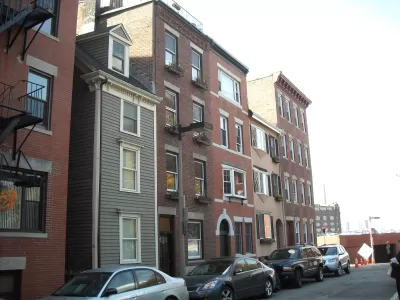A major for-profit affordable housing provider hasn't evicted a single tenant since early 2020. How did the company do it, and can its method be a model for other developers?

Tenants’ rights attorney Jay Rose spent four-plus decades waging legal battles on behalf of poor folks. So taking a job as a legal consultant for the nation’s largest for-profit affordable housing landlord might seem an odd choice. But executives at Boston-based WinnCompanies—which manages approximately $14 billion worth of largely affordable and military housing in 550 developments across 22 states—recently learned an unpleasant fact and knew the organization needed help from someone like Rose.
In 2018 WinnCompanies and other large Boston-area property managers were invited to join a newly formed Eviction Prevention Task Force, run by the Office of Housing Stability within Boston’s Department of Neighborhood Development. The group used company-provided information from 2015 through 2017 and data from the local housing court system to determine which landlords were doing the most evicting.
WinnCompanies learned it was the largest landlord in the city of Boston and, “we were also responsible for a fairly high rate of evictions in the city, and that’s not something we expected,” says Trevor Samios, senior vice president of Connected Communities, WinnCompanies’ resident services department. “It wasn’t a list we wanted to be on.”
The company hadn’t previously tracked its own eviction rates or reasons for evicting, which is typical; most landlords don’t. Even at the government level, one-third of U.S. counties don’t publish yearly eviction information, and there’s no federal government tracking. Samios did provide Shelterforce with some information he called his “back of the napkin” figures: WinnCompanies manages 7,304 affordable units in Boston. From 2015 to 2017, the company filed 1,178 eviction cases; 374 of those were executed.
The City of Boston wasn’t the only local government starting to ask questions around that time, Samios says; other jurisdictions were also searching for solutions to their own affordable housing crises and high eviction rates. So when Rose approached WinnCompanies with a plan in 2019, company executives decided to accept his offer to help them overhaul the company’s policies and processes.
Rose, who spent several years at Greater Boston Legal Services, poured his “pet peeves of the last 40 years” into the partnership, he says. The result, called the Housing Stability Program, “is me trying to get a major owner to be as tenant-friendly as possible,” Rose says, and it should save the company money.
The Nine Steps of Housing Stability
WinnCompanies wanted to cut its eviction rates by 50 percent within five years. Rose wanted to keep tenants from seeing the inside of a courthouse. To achieve both those goals, WinnCompanies’ has ...
FULL STORY: How One of Boston's Top Evictors Changed Its Ways

Trump Administration Could Effectively End Housing Voucher Program
Federal officials are eyeing major cuts to the Section 8 program that helps millions of low-income households pay rent.

Planetizen Federal Action Tracker
A weekly monitor of how Trump’s orders and actions are impacting planners and planning in America.

Canada vs. Kamala: Whose Liberal Housing Platform Comes Out on Top?
As Canada votes for a new Prime Minister, what can America learn from the leading liberal candidate of its neighbor to the north?

Washington State’s Parking Reform Law Could Unlock ‘Countless’ Acres for New Housing
A law that limits how much parking cities can require for residential amd commercial developments could lead to a construction boom.

Wildlife Rebounds After the Eaton Fire
Following the devastation of the Eaton Fire, the return of wildlife and the regrowth of native plants are offering powerful signs of resilience and renewal.

LA to Replace Inglewood Light Rail Project With Bus Shuttles
LA Metro says the change is in response to community engagement and that the new design will be ready before the 2028 Olympic Games.
Urban Design for Planners 1: Software Tools
This six-course series explores essential urban design concepts using open source software and equips planners with the tools they need to participate fully in the urban design process.
Planning for Universal Design
Learn the tools for implementing Universal Design in planning regulations.
Central Transportation Planning Staff/Boston Region MPO
Heyer Gruel & Associates PA
Institute for Housing and Urban Development Studies (IHS)
City of Grandview
Harvard GSD Executive Education
Regional Transportation Commission of Southern Nevada
Toledo-Lucas County Plan Commissions





























